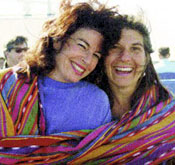For eight lucky students last quarter, award winning independent radio producer Nikki Silva offered the ideal blend of inspiration, instruction, and encouragement.
A star of public radio, Silva (B.A., aesthetic studies, 1973) has produced groundbreaking programming for National Public Radio with her longtime collaborator and fellow UCSC graduate Davia Nelson (B.A., politics, 1975). Over the years, the two women have attracted devoted listeners to several series, including Lost & Found Sound and the Sonic Memorial Project, an audio archive of the World Trade Center. The duo, known as The Kitchen Sisters, are now producing radio documentaries that explore how communities come together around food, so it was perhaps fitting that Silva proposed a potluck for the class's last meeting, and showed up with a colorful tablecloth and a fresh fruit tart.
"I was really excited to meet her," said Damaris Santos Palmer, a first-year graduate student in Social Documentation who hosted a radio program for three years during college but produced her first radio documentary last fall. "It was such an honor."
Throughout the quarter, Silva shepherded her students, whose abilities ranged from novice to quite advanced, providing basics on interviewing and recording, as well as feedback on how to structure a lengthy radio documentary and how to market finished pieces to NPR and other outlets. Spend your money on the microphone, she urged students, and get subjects out from behind their desks when you interview them. "It's a psychological thing," she said with a knowing smile.
Summing up her own approach, Silva said, "I don't ever want to tell anybody what they're supposed to think or feel. I want my story to make my listener think and feel."
Student projects included an evocative portrait of a Vietnam veteran who is counseling Iraq War veterans, a lighthearted piece by Palmer about the struggles parents face getting their toddlers to sleep at night, and a spirited account of survival among women doctoral students. Students will discuss their work on KZSC Radio on Thursday, April 17, at 4 p.m. with Silva and program host Bruce Bratton, who will play excerpts of student work.
Silva taught the five-week workshop course through the Community Studies Department's graduate program in Social Documentation. The opportunity to work with Silva attracted three graduate students in the program's audio emphasis, and Marc Ramos, assistant producer director in the Social Sciences Media Lab, provided technical support to the class.
"If you're going to work in public radio in any capacity, you're going to know The Kitchen Sisters," said first-year graduate student Briana O'Higgins (see profile).
Silva commiserated with students about deadlines, equipment failures, and technological glitches, and she regaled them with stories of her earlier work, including the 1980 piece that finally opened doors for The Kitchen Sisters--a portrait of a one-handed pool player.
Recounting the myriad errors she and Nelson made recording the interview, Silva lamented the fact that they had to rerecord the entire piece but said they were fortunate because "he was one of those rare people who can tell the same story time after time with detail and passion." During the editing, Silva and Nelson kept cutting the narration until they eliminated their own voices entirely, developing their trademark style of nonnarrated storytelling. "That was the piece that really pushed us over the top," said Silva.
The workshop format of the class played to Silva's strengths. A consummate brainstormer, she offered feedback and ideas on each piece as it developed over the course of the five-week class, and students followed her lead, weighing in with their opinions and suggestions.
Often, Silva used analogies about music or food. "It's like music: The verse is so long, the climax is here, and then the denouement. There are rules you can choose to break, but it is how people listen." Or: "You have to distill it, because no one has the ears for it that you do. You have to do it. It's hard. But when you take all the bits and put them together, you've just made espresso."
As students grappled with the ethics of how to portray their subjects and whether to invite their input during the editing process, Silva was empathetic yet firm. "In our work, they're not involved at all," she said of her subjects. "I always feel so obligated, but you have to figure out, am I the storyteller, or are they?"
Another afternoon, during a discussion of how to interview subjects about disturbing events in their lives, she encouraged them to be sensitive yet confident: "So many people need to talk. We're bearing witness. That's a really important contribution we're making."
Silva urged her students to seek audiences for their work. Responding to those who find the prospect of pitching their work daunting, Silva said, "Force yourself. You have to force yourself to just send it off. What can they say? No? The most important thing is to find the person you should be talking to."
And then she promised to get them names.



